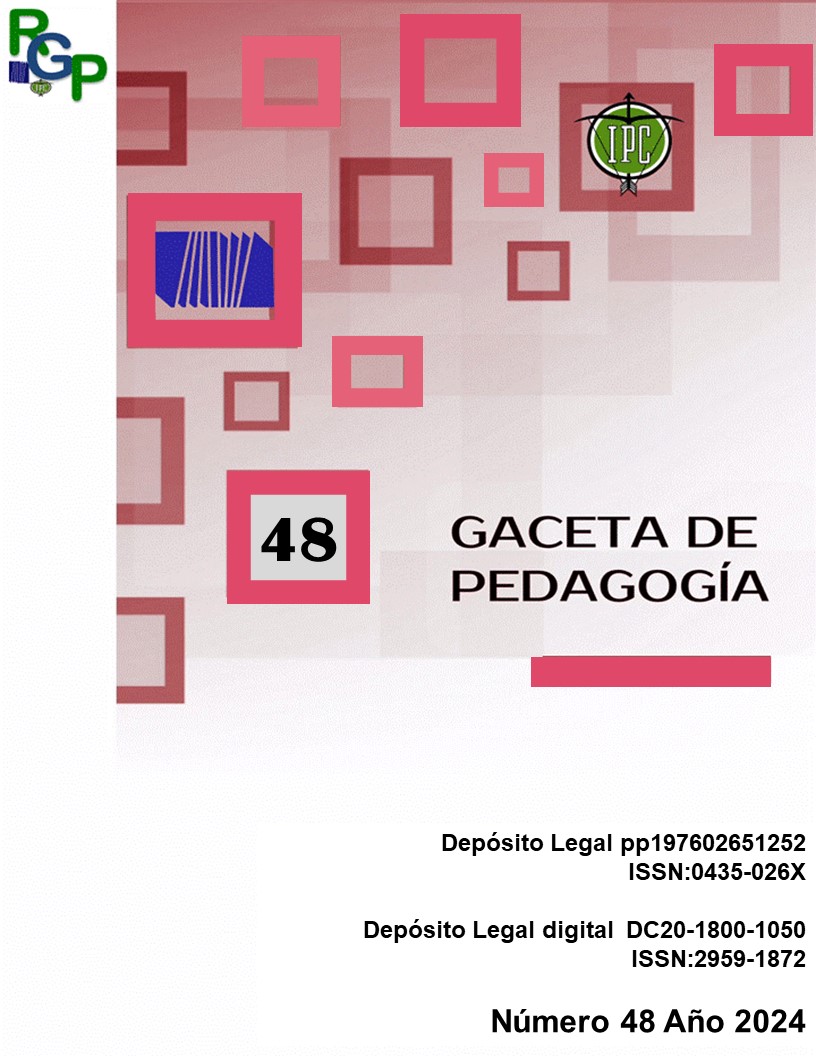Metacognitive skills: self-management of learning in the transition process towards a university career
DOI:
https://doi.org/10.56219/rgp.vi48.2443Keywords:
initial journey, metacognitive skills, university education, self-management of learningAbstract
Metacognitive skills allow you to reflect and direct your thinking, including becoming aware of the actions that favor the success of an activity or improving the learning process. The objective of the study was to identify them from the perspective of self-management of learning expressed by students of the initial journey of the health area of the Territorial Polytechnic University of the State of Mérida “Kléber Ramírez”, during its transition process towards a university career. The research was descriptive with a quantitative, cross-sectional approach. The stratified sample was 65 subjects. The data collection technique was the survey and a Likert-type questionnaire was used. The results reveal that metacognitive skills are fundamental for the academic performance of students new to the university, they represent a tool for self-management of their knowledge.
References
Abascal, E., y Grande, I. (2005). Análisis de encuesta. Editorial ESIC Madrid.
Barahona, R., y Aparicio, A. (2020). Conciencia metacognitiva en ingresantes universitarios de ingeniería, arquitectura y ciencias aeronáuticas. Propós. represent. 2020, vol.8, n.1, e272. ISSN 2307-7999.
Banco Interamericano de Desarrollo. (2022). El poder del currículo para transformar la educación: Cómo los sistemas educativos incorporan las habilidades del siglo XXI para preparar a los estudiantes ante los desafíos actuales. Editores: Mercedes Mateo Diaz y JungKyu Rhys Lim. doi.org/10.18235/0004360
Casasola, W. (2020). El papel de la didáctica en los procesos de enseñanza y aprendizaje universitarios. Revista Comunicación, 29(1-2020), 38–51.
Caram, G., Naigeboren, M., Gil de Asar, M.,y Bordier, M. (2020 Enseñanza y tutoría en el contexto de la virtualidad. XII Congreso Internacional de Investigación y Práctica Profesional en Psicología. XXVII Jornadas de Investigación. XVI Encuentro de Investigadores en Psicología del MERCOSUR. II Encuentro de Investigación de Terapia Ocupacional. II Encuentro de Musicoterapia. Facultad de Psicología - Universidad de Buenos Aires, Buenos Aires.
Elisondo, R., De la Barrera, ML., Rigo, DY., Kowszyk, DI., Fagotti Kucharski, E., Riccetti, A., y Siracusa, MR. (2016). Estudiantes hoy, entre Facebook, Google y Metacognición. Ideas para innovar en la Educación Superior. Revista de docencia universitaria, Vol.14, Núm. 1 pp. 225-244
Fernández, Mariana (2017). Autogestión del aprendizaje de los estudiantes universitarios de nuevo ingreso. [Trabajo de Maestría] Universidad de Carabobo. https://acortar.link/nQLxQb
Flavell, J. H. (1979). Metacognition and Cognitive Monitoring: A New Area of Cognitive-Developmental Inquiry. American Psychologist, 34, 906-911.
González, F. (1999). Procesos cognitivos y metacognitivos que activan los estudiantes universitarios venezolanos cuando resuelven problemas matemáticos. Epsilon: Revista "Thales". Nº 43-44. Pp 199-208.
Pajuelo, P. (2018). Programa metacognitivo en el desarrollo del pensamiento crítico de los estudiantes del 4to año de la facultad de ciencias de la educación y humanidades, Universidad de Huánuco, 2016. [Tesis Doctoral] Universidad de Huánuco https://acortar.link/Zeo4Vx
Piña, R., y Alfonzo, N. (2019). La metacognición en la educación universitaria. Un caso de estudio. Revista Electrónica De Psicología Iztacala, 22(2) pp 2255-2277. https://acortar.link/HVT6uh
Ponce Ponce, ME, (2016). La autogestión para el aprendizaje en estudiantes de ambientes medios por tecnología. Diálogos sobre educación. Temas actuales en investigación educativa, 7 (12), 1-23. https://doi.org/10.32870/dse.v0i12.258
Pozo, J. (1989). Teorías Cognitivas del Aprendizaje. Madrid: Ed. Morata.
Sureda, J., y Comas, R. (2006). Internet como fuente de documentación académica entre estudiantes universitarios. Palma: Xarxa Segura IB / Fundación Universitat-Empresa de les Illes Balears. https://acortar.link/X6E1Wq
UNESCO. (2019). Declaración mundial sobre la educación superior en el siglo XXI: Visión y Acción. Revista Educación Superior Y Sociedad (ESS), 9(2), 97-113. https://acortar.link/W9ZXkV
Valenzuela, M (2019). ¿Qué hay de nuevo en la metacognición?: Revisión del concepto, sus componentes y términos afines. Educaçao e Pesquisa: Revista da Faculdade de Educação da Universidade de São Paulo. ISSN-e 1678-4634, Vol. 45, Nº. 1.
Published
How to Cite
Issue
Section
License

This work is licensed under a Creative Commons Attribution-NonCommercial-NoDerivatives 4.0 International License.

